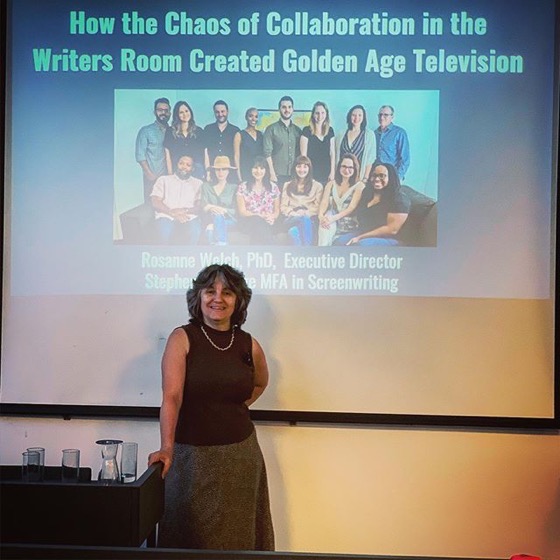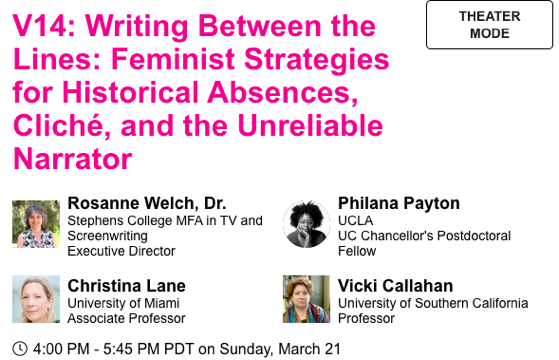Subscribe to Rosanne’s Channel and receive notice of each new video!
When the folks hosting the conference announced their theme as “Screen Narratives: Chaos and Order” the word ‘chaos’ immediately brought to mind writers rooms. I offered a quick history of writers rooms (the presentations are only 20 minutes long) and then quoted several current showrunners on how they compose their rooms and how they run them.
Transcript
Kenny Johnson brought science fiction more seriousness, right? So he started The Bionic Woman. He moved on to The Incredible Hulk, then V, and then Alien Nation. A beautiful show about an alien nation and assimilation into new cultures all done through science fiction. So he brought social justice to science fiction and that was a very distinct way that his voice worked. I got to be his assistant for a while.
For more information on the Screenwriting Research Network, visit
* A portion of each sale from Amazon.com directly supports our blogs
** Many of these books may be available from your local library. Check it out!
Podcast: Play in new window | Download
Subscribe: RSS
![12 Kenny Johnson from How The Chaos Of Collaboration in the Writers Room Created Golden Age Television [Video]](https://rosannewelch.com/wp-content/uploads/2021/05/srn-porto-12.jpg)


![11 Donald Bellisario from How The Chaos Of Collaboration in the Writers Room Created Golden Age Television [Video]](https://rosannewelch.com/wp-content/uploads/2021/05/srn-porto-11.jpg)
![10 Steven Bochco from How The Chaos Of Collaboration in the Writers Room Created Golden Age Television [Video]](https://rosannewelch.com/wp-content/uploads/2021/04/srn-porto-10.png)
![09 More on Stephen J. Cannell from How The Chaos Of Collaboration in the Writers Room Created Golden Age Television [Video]](https://rosannewelch.com/wp-content/uploads/2021/04/srn-porto-09.png)
![08 Stephen J. Cannell and Adam-12 from How The Chaos Of Collaboration in the Writers Room Created Golden Age Television [Video]](https://rosannewelch.com/wp-content/uploads/2021/04/srn-porto-08.png)
![07 The Writer’s Voice from How The Chaos Of Collaboration in the Writers Room Created Golden Age Television [Video]](https://rosannewelch.com/wp-content/uploads/2021/04/srn-porto-07-1.jpg)
![06 The Universal Studios Writers Pool from How The Chaos Of Collaboration in the Writers Room Created Golden Age Television [Video]](https://rosannewelch.com/wp-content/uploads/2021/03/srn-porto-06.jpg)
![05 The Monkees Writer’s Room from How The Chaos Of Collaboration in the Writers Room Created Golden Age Television [Video]](https://rosannewelch.com/wp-content/uploads/2021/03/srn-porto-05.jpg)
![Dr. Rosanne Welch Presents “When Men Forget Women: The Many Ways Male Screenwriters Fail to Mention their Female Colleagues in Oral Histories” at SCMS 2021 [Video]](https://rosannewelch.com/wp-content/uploads/2021/03/scms-vidoe-title-card.jpg)

![04 The Comedy Writer’s Room from How The Chaos Of Collaboration in the Writers Room Created Golden Age Television [Video]](https://rosannewelch.com/wp-content/uploads/2021/03/srn-porto-04.jpg)